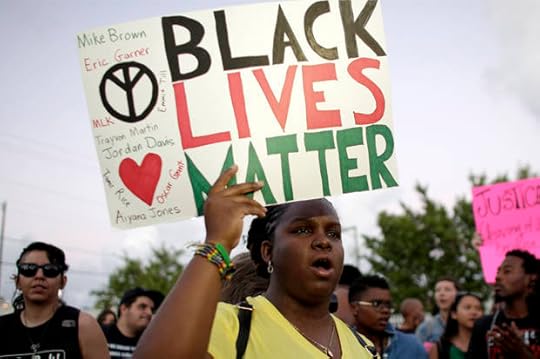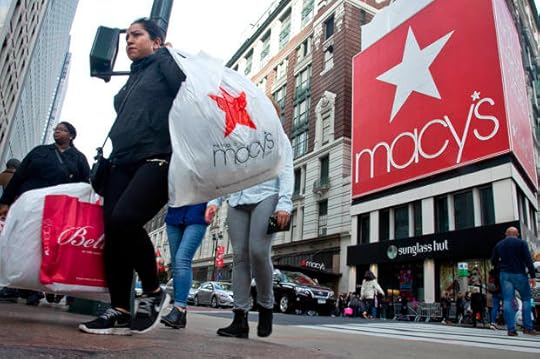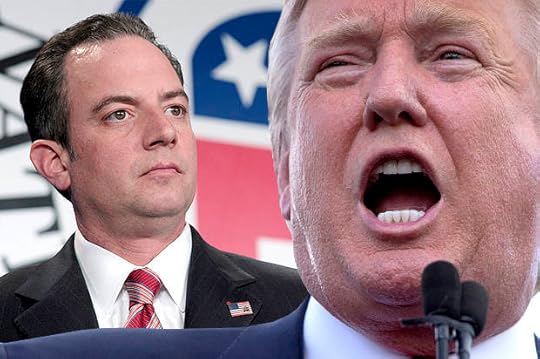Helen H. Moore's Blog, page 691
August 12, 2016
BLM platform blasts “U.S. empire,” militarization, war on terror, AFRICOM

(Credit: Reuters/Eric Miller)
The Movement for Black Lives released its much-anticipated platform on Aug. 1. The document thoroughly details demands across a wide variety of issues, each of which is accompanied by concrete strategies for achieving these goals.
Perhaps the most subversive part of the platform is its scathing critique of what it describes as the “U.S. empire,” and its call for international solidarity and coordinated direct actions with liberation movements around the world. Here the movement proposes some of its most progressive, even revolutionary, ideas.
“America is an empire that uses war to expand territory and power,” the Movement for Black Lives states clearly. “American wars are unjust, destructive to Black communities globally and do not keep Black people safe locally.”
The platform calls for cutting the U.S. military budget by 50 percent, closing the more than 800 U.S. military bases around the world and pulling back U.S. troops. This money, the Movement for Black Lives says, should then be re-invested in communities that have been harmed by the U.S. government.
“Resources and funds needed for reparations and for building a just and equitable society domestically are instead used to wage war against a majority of the world’s communities,” the platform stresses.
And this invest-divest policy should apply globally. The Movement for Black Lives demands reparations not only for Black Americans, but also for “countries and communities devastated by American war-making, such as Somalia, Iraq, Libya and Honduras.”
The Movement for Black Lives platform was drafted by a “united front” of more than 25 groups, including the Black Lives Matter Network, Dream Defenders, Color of Change and more. An additional more than 35 organizations joined them in endorsing the platform.
Salon spoke with Ben Ndugga-Kabuye, one of the co-authors of the anti-imperialist plank of the platform, and an organizer with the activist group the Black Alliance for Just Immigration.
“We are very much aware that the Movement for Black Lives in the U.S. is part of an international movement that is just as vibrant in Canada, or Colombia, or South Africa or any number of places,” Ndugga-Kabuye said.
“What brought us to this particular analysis was understanding that, insofar as the U.S. has a particular role in the world, any platform that we were to put out would have to reflect solidarity not only with Black communities around the world, but also liberation movements more broadly,” he explained.
In addition to a drastic reduction in military spending and reinvestment of the saved tax dollars in communities and social services, the platform calls for ending military aid and arms sales to countries and organizations engaging in human rights violations, endorsing the Leahy Law.
Nuclear weapons are mentioned, too. The Obama administration announced that it would invest $1 trillion in tax dollars in revitalizing the U.S. nuclear program over the next 30 years. The Movement for Black Lives instead demands a reduction in the stockpiling of nuclear weapons, so this money can go to helping people.
The platform condemns the U.S. federal discretionary budget for allotting more money to the military than to education, health care, affordable housing, social security and unemployment benefits combined.
It also blasts the military-industrial complex for offering “massive profits to private corporations from the death of our global diaspora by handing out massive government contracts to expand US military presence across the globe, while resources for domestic infrastructure and social programs to meet the needs of Black people and working class communities within the US diminishes.”
Former military personnel, the platform proposes, can be re-trained for “domestic peace-making roles that redesign and rebuild the country’s polluting and crumbling infrastructure with released funds from war-making.” It adds that this new infrastructure plan should be “based on a commitment to a green economy and deep understanding of the threat of climate change.”
The platform additionally outlines many socialist policies, demanding universal health care, full employment, housing for all and free quality public education.
“The interlinked systems of white supremacy, imperialism, capitalism and patriarchy shape the violence we face. As oppressed people living in the US, the belly of global empire, we are in a critical position to build the necessary connections for a global liberation movement,” it says.
“Until we are able to overturn US imperialism, capitalism and white supremacy, our brothers and sisters around the world will continue to live in chains.”
Militarization of Africa
The anti-imperialist plank of the platform places particular emphasis on the U.S. military’s policies in Africa. It harshly criticizes AFRICOM, the United States Africa Command, which oversees military operations on the continent.
Ndugga-Kabuye stressed that the platform’s opposition to what it calls “U.S. militarization of Africa” is a crucial part of the movement.
“We can’t write a policy about the Movement for Black Lives without talking about Africa as the central part of that movement. All of us are ultimately from there, and many have ties to the continent,” he said.
The platform accuses the U.S. of using the threats of terrorism and Islamist extremism in Africa in order “to expand western colonial control over the region, its people and their resources.”
“AFRICOM is a major example of U.S. empire and is a direct threat to global Black liberation,” the Movement for Black Lives writes.
It cites a detailed list of examples of U.S. militarization, including bombing, drone strikes, commando raids, black ops missions, special operations, the arming and training of soldiers in multiple countries, ostensible anti-piracy actions and more.
The platform calls the U.S. drone war in Somalia “devastating.” It condemns the U.S. for fueling violence in the Democratic Republic of Congo and adds, “Not only have U.S. backed African intervention armies committed atrocities but U.S. private companies extract the worlds wealth from Congolese soil.”
The Movement for Black Lives also emphasizes the impact of this militarization on women. “Women and the most vulnerable in our communities pay the price of U.S. intervention and the accompanying genocides and civil wars,” the platform says.
Ndugga-Kabuye said the plight of African refugees and migrants is especially important.
“We have particular interest in this because we began to do work around the current, ongoing crisis of African migrants across the Mediterranean,” he explained, referring to the work of the Black Alliance for Just Immigration.
“And the increasing militarization of Africa is tied to the increased difficulty of traveling across Libya and other parts of North Africa into Europe,” he added.
NATO carried out a regime-change bombing campaign in Libya in 2011, which toppled the government and plunged the country into chaos. In the years since, a civil war has devastated the oil-rich North African nation. Extremist groups like Ansar al-Sharia and even ISIS have seized large swaths of the country.
Hundreds of thousands of Libyans have been displaced by the violence. And other African refugees and migrants fleeing violence have traveled through Libya in hopes of traveling across the Mediterranean and seeking asylum in Europe.
As Salon has previously reported, NATO announced plans to impose a blockade on Libya to stop the refugee influx. The refugee rights program director at Human Rights Watch told Salon that the plan likely violates international law, and that the humanitarian situation on the ground in Libya is nightmarish.
“After the imperialistic overthrow of the Libyan government, there was a rise of a number of rebel organizations that now give free reign to smugglers and terrorize migrants — a lot of them Somali, Eritrean, Nigerian and West African — who are traveling across Libya,” Ndugga-Kabuye said.
“Not only was it difficult before, but it’s much harder now, and it’s not unusual to see hundreds of Africans drowning in the Mediterranean every week,” he added.
Ndugga-Kabuye said the Movement for Black Lives was obligated to make this an important part of its program. “We had to make sure that we pointed out the brutal impact of those policies and the U.S. and the West’s role in creating that dynamic.”
Wars on terror and drugs
The Movement for Black Lives platform is also intensely critical of the so-called U.S. “war on terror,” which was declared by President George W. Bush after the Sept. 11, 2001 attacks.
“The war on terror has not made us safer and has only increased hopelessness as our fears are realized,” the platform declares.
It blasts the U.S. for killing millions of people in the Middle East. The Movement for Black Lives also notes that U.S. military spending has skyrocketed since 9/11, and links police militarization to war and military spending, writing, “State violence within the U.S. is intimately linked with empire and war-making globally.”
“U.S. arms and military corporations have made billions of dollars in profit off of waging disaster and destabilization in the Middle East, while increasing western control over the land and resources of the region,” the platform says.
It also harshly criticizes the close U.S. alliance with Israel, which it describes as an “apartheid state” that is carrying out a slow “genocide” of Palestinians.
The decades-long U.S. war on drugs is another target. The Movement for Black Lives condemns the war on drugs and its horrific impact on South America.
Black minority groups in Latin America, like the Garifuna, have been especially harmed by U.S. policy, the platform notes. And Dominicans of Haitian descent have endured brutal discrimination and mass deportations.
The Movement for Black Lives slams the 2009 U.S.-backed military coup in Honduras, which replaced a left-wing leader with a brutally repressive right-wing regime, and opposes “U.S. trained militaries that have devastated the region.”
It also writes of “the disastrous impact” of “continual U.S. intervention that has filled modern Haitian history with coups and violence.”
“The Movement for Black Lives is an international effort, and we’re very much in solidarity with our folks, our communities, our liberation movements in Palestine, to Somalia, to Canada, to Colombia, Brazil and Haiti,” Ndugga-Kabuye told Salon.
He added, “We want to make sure our folks around the world know we love them and are committed to them.”
August 11, 2016
The dangers of Pokémon Go: Kids’ brains are vulnerable to virtual and augmented reality

(Credit: AP/Alan Diaz)
A few weeks back I was sent a link to an article about Pokémon Go—the latest craze that has been sweeping not only our native Manhattan, but seemingly the entire country. The person who had sent me the article thought I’d be interested in this latest tech development because of my work: I’m a psychologist and professor who specializes in treating addiction and working with adolescents; and I had just written a book called “Glow Kids,” which explores some of the uncomfortable clinical realities of too much screen time.
Two days later I was sent yet another link. This latest article from a major national newspaper waxed poetic about kids and the new Pokémon craze. According to that article, Pokémon Go is a parent’s dream, a video game holy grail: a game that actually got kids up off the couch and outside exploring and interacting with the real world—albeit while staring at a screen and pursuing an illusory augmented reality hologram.
That small detail aside, I had to ask myself: well, is this the game that finally proves the screen alarmists wrong? After all, kids are going outside to play the game and collaborating with others to find clues in their digital scavenger hunts. Aren’t those good things? In that same pro Pokémon Go article, a child and adolescent psychologist interviewed for the piece, was quoted saying “it gets kids out in the world and promotes socialization. It seems that kids are using it as a tool to connect to each other and the world around them.”
All that sounds perfectly reasonable, but my research and clinical work indicates otherwise. If you’re a child or pre-teen, there may be a price to pay. To be clear: If you’re an adult, have at it! Pokémon Go to your heart’s content; wander the streets looking for the little augmented reality buggers. Just be careful you don’t walk into oncoming traffic or light posts, but Pokémon your days away if you like.
But children have additional vulnerabilities when they interact with interactive and immersive screens; their brains and what psychologists call “reality testing”—the ability to discern what’s real and what isn’t—are not fully developed yet. That’s why researchers who study the effects of immersive and interactive video game experiences have coined the term “Game Transfer Phenomenon” (GTP)— a reality-blurring psychotic-like feature that young people who are chronic gamers experience.
Researchers Drs. Mark Griffiths and Angelica Ortiz de Gortari conducted three studies with over 1,600 video gamers in Great Britain. They found that many showed GTP effects: gamers hearing or seeing aspects of the game hours or days after they had stopped playing. Some reported hearing sound effects, music and characters voices; others heard explosions, sword swipes and screams. One gamer reported hearing someone from the game constantly whispering “death” for a few days after he had stopped playing while others reported seeing images from the game pop up in front of their eyes.
Indeed, many young children who are Minecraft devotees report seeing the real world in the cube shapes of the game or see the cubes in their dreams. In my own private clinical practice, I’ve had the incredible experience of working with young gamers who had blurred reality with that of their game; one teen had to be psychiatrically hospitalized for a month after he had fallen down the rabbit hole — or into the matrix, pick your metaphor — of World of Warcraft and suffered a version of what I term “Video Game Psychosis.”
To be sure, there are children and teens with underlying emotional or psychological issues that may make them more vulnerable to such unfortunate outcomes when they are exposed to reality-blurring game experiences. But that’s the point—we don’t always know who those particularly vulnerable children are when we expose them to “the Matrix” (the mind-bending illusory world in the Keanu Reeves trippy film).
Beyond the work of Drs. Griffiths and de Gortari, researchers at Tel Aviv University published documented cases of “Internet-related psychosis” indicating that immersive screens were generating “true psychotic phenomena” and that this spiraling psychopathology was “a new consequence of our times.” Dr. Joel Gold at NYU and his brother Ian at McGill University are investigating whether the reality-severing aspects of technology can lead to hallucinations, delusions and genuine psychosis.
Finally, my friend and colleague Commander Dr. Andrew Doan, a Johns Hopkins-educated M.D. and Ph.D. in neuroscience who is the Head of Addiction and Mental Health Research for the U.S. Navy/Pentagon, has researched video game effects and has documented case studies of young video-gaming soldiers who, when combined with sleep deprivation, had psychotic-like delusions and, in one instance, homicidal ideations. Yet when the homicidal gamer unplugged and got some sleep, the ideations went away.
What remains unclear, however, is whether or not these psychotic-like effects are more transitory in older players who have a better developed sense “reality testing” before they started gaming than children who do not yet have as clearly defined sense of what’s real and what’s not. Could the hallucinatory effects look more like permanent psychosis in younger gaming kids? While research on that is lacking, I have seen some evidence that that may be the case in my private clinical practice.
And let’s keep in mind that all these potential reality-blurring effects just mentioned were the byproducts of two-dimensional screens, which are not nearly as immersive—and thus as impactful on the psyche—as immersive Virtual Reality or Augmented Reality experiences. A book can be immersive; a video game, by virtue of its visual intensity and interactive nature are known to be even more immersive. VR and Augmented reality? They take reality-blurring to a whole new level.
We might heed a parable from the original Star Trek. In the “The Menagerie” (1965) a badly burned, wheel-chair bound Captain Pike—Captain Kirk’s predecessor—is given the opportunity to live out his life on a planet called Talos IV. The Talotians are able to manipulate reality and create very pleasing illusions—entire worlds of exciting and tempting Virtual Realities.
Yet this species that has the power to control illusions is also a dying species that has atrophied as a result of their illusion obsession. In the end, Captain Pike has a choice: live a miserable existence as quadriplegic burn victim who can’t speak—or be young again and live the life of his dreams.
Which would you choose?
Today, hundreds of thousands of people are embracing the idea of living in an illusion as Avatar-based “synthetic communities” like Second Life are exploding and new VR and Augmented realities are becoming all the rage.
The futuristic Hololens—a VR and Augmented Reality headset by Microsoft—was developed by Alex Kipman. The stringy-haired Microsoft designer who looks the part of hipster visionary, held a mind-blowing TED talk in February 2016 in Vancouver. Interestingly, he’s anti-screens because of their archaic two-dimensional limitations.
During his talk, Kipman criticizes the way we have become trapped by screens and describes a future world of interactive technology that is entirely immersive: “Today, we spend most of our time tapping and looking at screens.”
Seeking to create what sounds like a digital Ubermensch, Kipman discusses the “infinite possibilities” of a quantum universe and the “super powers” that computers can give human beings, as he decries the limitations of being stuck in a 2-dimensional screen world while we can now have “digital powers” to create reality within our own world. And then, with a wave of his hand, he creates a 3-dimensional ice cave, complete with hanging stalactites and growing stalagmites that seem to emerge directly out of the TED red dot on the stage.
“We are all beginning to build technology that will return us to the humanity that brought us to where we are today. Technology that will let us stop living inside this world of 2-D world of monitors and pixels and let us start remembering what it feels like to live in our 3-D world.”
It’s an odd vision; using technology to “remember” what if feels like to live in our 3-D world when we actually do live in a 3D world that doesn’t require Kipman’s Hololens to experience.
After watching Kipman talk, I am left wondering if I’ve just seen a visionary or a madman who will destroy the very essence of humanity with his VR crusade. I can’t help but think again of poor Captain Pike and the Talosians; is Kipman’s illusory world the one that we should all be aspiring to create and live in? Or, like the Talosians, is it the one that will decay and atrophy our species?
The answer remains to be seen. While we can argue the benefits of VR and Augmented Reality for consenting adults, as a psychologist who has researched and clinically worked with over a thousand kids over the past 15 years, what does seem clear is that such intensive and immersive reality-blurring is not age-appropriate for young children who are still developing their sense of what is real and what isn’t. We need to keep them out of the mind-bending Matrix for as long as possible.
Decoding Obama’s playlist: Inside his summer jams, a hint of what we’ll miss most about him

Barack Obama; Clockwise, from top left: Courtney Barnett, The Beach Boys, Prince, Pharrell Williams. (Credit: AP/Jacquelyn Martin/Barry Brecheisen/David J. Phillip/Reuters/Dylan Martinez)
Presidents define themselves in all different ways, and with only a few months left in office, President Obama has dropped a summer playlist (or rather, two — one for daytime listening and one for the evening) that will be among his final statements before leaving office. Obama has seen his approval ratings go higher than usual this year, and he’s been in a don’t-give-a-damn phase of his presidency, but few politicians do anything without calculating how it will land. This release, for instance, may’ve been timed to head off Donald Trump’s accusation that Obama was “the founder of ISIS.” In any case, it’s worth looking at as a document of how the president wants to see himself as well as how we wants us to see him.
At the most general level, this is a smart, wide-ranging list, with a mix of hip-hop, rock, jazz and funk. There’s not much on it that’s obvious or overplayed, and it all tends to be music that someone who really listens might like: This is not just what TV commercials and big marketers beam at us.
And while it’s hard to know how much this was put together by a committee for image-massaging, it certainly looks like something a guy like Obama — an educated, cosmopolitan black man in his early 50s who has cared about music for a long time — would really listen to. That is, while it’s fashionable in some ways, it doesn’t seem to be straining to capture “what the kids are listening to.”
Let’s break it down a little more specifically.
Given the enormous enthusiasm with which GOP candidates have embraced rap, Obama’s list may have less hip hop than, say, Marco Rubio’s equivalent might have. Generally, Obama has chosen hip hop from the smarter, less violent side of things. Chance the Rapper and Common also have the advantage of being, like Obama, from Chicago.
Obama’s hip hop selections have two notable omissions: Kanye West and the Beyonce. Obama may simply not be moved by the often-abstract music of his fellow Chicagoan. And the music from “Lemonade” may be too politically confrontational for Obama to feel comfortable putting it on his list. (This said, his list is not free of political or protest-driven content.) It may also come from his interest in not picking anything obvious, and at this point West and Beyonce are pretty hard to escape. (Obama has also famously called West “a jackass.”)
Instead, he’s gone for critically acclaimed but not ubiquitous figures. Leon Bridges is not only a talented neo-soul singer whose style recalls Sam Cooke and the early Marvin Gaye, he’s given, like his models, to protest songs. (The pick here, “Smooth Sailin’,” is not one of them.)
The Bridges choice shows a larger theme here — Obama’s preference for a kind of retro cool no matter what the genre. Even some of the rap choices are retro, coming from artists informed by jazz and soul music. D’Angelo (“Lady”) and Anthony Hamilton (“Do You Feel Me”) are hardly identical, and they’re a bit less studied than Bridges, but they’re very deeply rooted in ‘60s R&B. Given Obama’s fondness for Al Green, they’re natural choices.
Same for one of the youngest musicians on the list, Courtney Barnett, the wry Australian whose wry songs are deeply original but also appeal to fans of Liz Phair and ‘60s Dylan.
Obama also makes some smart jazz choices. I’ve found Esperanza Spalding to be a little overrated — the jazz world has been so eager for someone like her that it’s flipped its collective lid despite the fact that her talents are probably not all filled in yet — but “Espera” is one of her most distinctive songs. The other jazz selections are well-known from major artists: Billie Holiday’s rueful “Lover Man,” Miles Davis’s pensive “My Funny Valentine,” and Charles Mingus’s soulful “II B.S.” would not be out of place in a Starbucks on a Wednesday afternoon. They’re also great songs, though, that are capable of turning newcomers on to jazz. (The Nina Simone choice, “Sinnerman,” is a little less familiar and probably not as immediately accessible.)
Did Obama pick Simone and Davis because of the recent movies? Maybe. (For what it’s worth, “My Funny Valentine” comes from a period well before the one portrayed in Don Cheadle’s film.)
When picking an Aretha Franklin song, Obama avoided easy choices likes “Respect” and “I Never Loved a Man,” picking the early ‘70s song “Rock Steady,” which is not hard to imagine provoking a family dance party.
And anything by Prince would be fine given the Purple One’s much-lamented departure. “U Got the Look” is a smart choice — catchy and not overexposed, and coming from perhaps Prince’s best album, “Sign o the Times.”
There’s only one place where the president picks a very famous song by a household name-size artists: There are better Beach Boys songs than “Good Vibrations” — and many that were not used by television commercials — but, hey, for a summer playlist, that’s not a bad choice.
Tone-wise, the songs he’s selected range from the sunny, mellow groove of the Aretha number to the complicate despair of Wale’s “LoveHate Thing,” from the extroverted fun of Janelle Monae’s “Tightrope” to the wistfulness of War’s “All Day Music.”
These two playlists, then, show us some of the qualities a lot of us will miss when Obama has left office. It shows the ability to listen to other people’s points of view: His taste on display here is not monochromatic the way I imagine that of a more rigid politician, whether George W. Bush or Bernie Sanders, would be. It’s generationally hybrid, with a bit of Boomerism and a bit of Gen X attitude. It does not seem stage-managed as fiercely as a Hillary Clinton list would likely be. It’s not hostile and ignorant the way a Trump playlist would be. And it sounds like someone who really cares about music and wants to share some of his fervor.
Trump’s birtherism is now Republican gospel: 72 percent of GOP voters still doubt President Obama’s citizenship

With his near daily, and often times hourly, outrageous remarks dominating the news cycle in a rinse-and-repeat pattern of outrage followed by a refusal to budge, Donald Trump and his campaign of demagoguery have drowned out otherwise newsworthy political developments for over a year now.
“On other campaigns, we would have to scrounge for crumbs,” one senior Hillary Clinton adviser told Time recently. “Here, it’s a fire hose. He can set himself on fire at breakfast, kill a nun at lunch and waterboard a puppy in the afternoon. And that doesn’t even get us to prime time.”
Just this week alone, Trump informed his supporters and the media that there is no use in waiting for any so-called “presidential pivot,” before he proceeded to suggest a second Amendment remedy to a possible Clinton win and accused President Obama of being “the founder of ISIS.”
While Trump was making his latest outrageous statement at a rally in Florida Wednesday evening, NBC News released a very revealing — albeit rather apparent — poll finding that seems to have been underreported.
72 percent of registered Republican voters still hold doubts about the President’s citizenship, even as his second term in office enters its final months.
According to the NBC News|SurveyMonkey poll conducted in late June and early July of more than 1,700 registered voters, only 27 percent of Republicans agree with that Obama was born in the U.S. statement, while 41 percent disagree.
Another 31 percent of Republicans expressed their continued confusion on the matter elevated to prominence by the “Birther-in-Chief,” Trump, responding that they neither agreed nor disagreed with the statement:
Since there is no use in fact checking this myth that is seemingly widely held by Republicans, I offer a brief history of Trump’s five year long birther campaign — in tweets:
An 'extremely credible source' has called my office and told me that @BarackObama's birth certificate is a fraud.
— Donald J. Trump (@realDonaldTrump) August 6, 2012
How amazing, the State Health Director who verified copies of Obama’s “birth certificate” died in plane crash today. All others lived
— Donald J. Trump (@realDonaldTrump) December 12, 2013
I wonder if President Obama would have attended the funeral of Justice Scalia if it were held in a Mosque? Very sad that he did not go!
— Donald J. Trump (@realDonaldTrump) February 20, 2016
The end of discount luxury? The exodus of high-end brands is killing department stores

FILE - In this Nov. 27, 2015, file photo, shoppers carry bags as they cross a pedestrian walkway near Macy's in Herald Square in New York. Macy’s said Thursday, June 16, 2016, it has reached a tentative deal with the union representing workers at its flagship store in New York City, avoiding a strike. (AP Photo/Bebeto Matthews, File) (Credit: AP/Bebeto Matthews)
Luxury fashion brands have always lured customers with rarified products then chasing many of them away with their price tags. A fundamental part of the market math for high-end goods is that they need to be available, but not too available.
The problem vexing many well-known luxury fashion brands is that they’ve become too easy to buy as the struggling department stores that carry them turn to big red “half-price off” signs and an incessant stream of sale specials. The rise of ecommerce has essentially turned brick-and-mortar department stores into barely disguised discount outlets, and that hasn’t sit well with higher-end, off-the-rack fashion brands like Ralph Lauren and Calvin Klein.
On Wednesday, Michael Kors became the latest name brand to throw down the gauntlet against department store discounting. CEO John Idol said the company is halting all promotional activity at outlets that carry its handbags and other accessories.
“We think it’s creating confusion in the consumers’ mind relative to the value of the Michael Kors brand, when it’s being seen so often on sale in so many different places,” Idol said during his company’s fiscal first quarter conference call on Wednesday morning.
The call seemed to back up with bad news: Same-store sales — a key retail metric that excludes recently opened outlets — for Michael Kors-owned boutiques plunged more than 7 percent in the three months ending July 2, and sales revenue dropped 16 percent, to $147 million, compared to the same period last year.
Michael Kors’ decision comes a day after the brand’s main rival, Coach, pulled its products from 250 department stores across North America that it says were harming its exclusive reputation. “While we understand that customers may use department stores for trial and shopping across brands, the high level of promotional impressions created negatively impacts our long-term brand health,” Coach CEO Victor Luis told analysts amid its fiscal fourth quarter earnings release on Tuesday.
Both Coach and Michael Kors are wagering that a reduced presence in struggling brick-and-mortar department stores like Macy’s and Nordstrom will lead to increased sales at their company-owned boutiques and websites where they have more control over brand perception. Other fashion brands, including Calvin Klein and Ralph Lauren, which closed 50 stores earlier this year, are also struggling with this over-saturation.
If luxury brands are facing losses, the department stores’ situation is even more dire — ecommerce already represented an existential threat and now there’s the exodus of high-end brands to contend with. On Thursday Macy’s announced it was closing 100 underperforming stores to focus its resources on prime brick-and-mortar locations and developing its own ecommerce capabilities.
“The reality is that luxury demand is falling,” industry consultant Bob Phibbs, CEO of The Retail Doctor, told Salon. “Europe is weak, China is weakening, and with the current politics in the U.S. people here are afraid to buy. Foot traffic has gone down everywhere.”
Phibbs adds that the solution is for these brands is to be cultivate exclusivity by producing fewer items, pull those products away from in-store discounts and regain control over how they’re marketed. “Nobody likes the idea of retrenching, but that’s the story for luxury goods right now,” said Phibbs. “The top one percent of the world just isn’t buying as much as they were.”
Capitalizing on stupidity: Today, Trump called Obama a terrorist — something he’s being doing quietly since 2011

Barack Obama, Donald Trump (Credit: Reuters/Yuri Gripas/Carlo Allegri/Photo montage by Salon)
Donald Trump has transgressed political norms without consequence for most of his campaign. He appeared to have crossed a line, however, with his attacks on the Khan family two weeks ago. Suddenly, fence-sitting Republicans like Sen. Susan Collins and Rep. Adam Kinzinger decided to abandon ship. Even Trump supporters like Newt Gingrich fumbled for defenses of his behavior.
It was sufficiently bad that the Trump campaign began pushing rumors about an imminent “pivot.” Trump was finally ready to get serious and feign decency. To prove it, he read from hand-held scripts at rallies last weekend, hoping to assuage panicked Republicans. Then he gave a conventional speech on the economy at the Detroit Economic Club. For 72 hours, Trump was almost a normal candidate.
But on Tuesday, less than 24 hours after his latest pivot, Trump returned to form with his most revolting gaffe thus far. At a rally in North Carolina, he drifted off script and joked about the political murder of his opponent, Hillary Clinton. “If she gets to pick her judges, nothing you can do, folks,” he said casually. As the crowd obediently booed, he added: “Although the Second Amendment people – maybe there is, I don’t know.” There’s no point in debating the implication here – it’s obvious.
On Wednesday night, Trump continued his non-pivot pivot with a rambling, incoherent speech in Fort Lauderdale. The highlight of the evening consisted in Trump calling the President of the United States a terrorist. “In many respects, you know, they honor President Obama,” Trump said. “ISIS is honoring President Obama. He’s the founder of ISIS. He founded ISIS. And I would say the co-founder would be Crooked Hillary Clinton.”
The allusion to political assassination was genuinely shocking, even by Trump’s abysmal standards, but what he said on Wednesday, while grotesque and false, was anything but surprising. In fact, implying that President Obama is a terrorist is essentially the first thing Trump did as a presidential candidate.
In 2011, Trump lunged into the political arena by aligning himself with the birther movement. Birtherism is an inescapably racist theory; there’s no reason to believe it apart from bigotry. It springs from a nativist fear of a black president with a Muslim name who represents cultural progress. This was Trump’s “original sin,” as James Carville put it in an April column for Media Matters, and it’s been obscured by all the terrible things he’s said and done since.
It’s hard to overstate how extraordinary it is that the GOP nominated a birther for president. These are people who reject the legitimacy of our first African-American president, precisely because he’s African-American. This is Trump’s chosen base, and he owes his political existence to their allegiance. It’s why he’s been dog-whistling to white nationalists since he started campaigning. His supporters internalized the signal he sent in 2011 and they were with him the moment he descended that escalator at Trump Tower.
To review, the birthers contend that Obama is a secret Muslim Manchurian candidate who, it turns out, was born in Kenya, not Hawaii. This is really just another way of calling the president a terrorist, is it not? Indeed, one can – and should – draw a straight line between Trump’s birtherism and his insinuation that Obama is the founder of the world’s largest terrorist organization.
Whether Trump believes this lunacy is irrelevant. He knows his audience is disposed to believe it (Obama’s a Muslim Manchurian candidate, after all) and so its a piece of red meat to toss about at a rally. That’s what Trump was up to in Fort Lauderdale. This wasn’t an argument about Iraq or Obama’s decision to draw down troops., as Trump insists. He has already laid the blame for ISIS right where it belongs. Here’s what he said during one of the early GOP primary debates:
“The war in Iraq was a big, fat mistake, all right?…The war in Iraq, we spent $2 trillion, thousands of lives, we don’t even have it. Iran is taking over Iraq with the second-largest oil reserves in the world…So George Bush made a mistake. We can make mistake. But that one was a beauty. We should’ve never been in Iraq. We have destabilized the Middle East.”
This is the most accurate statement Trump has made as a candidate. Bush invaded Iraq without a plan, not Obama. Bush disbanded the Iraqi army and imprisoned the very people who later created ISIS, not Obama. Bush “destabilized the Middle East,” not Obama. The man who made the above statement knows who dug the hole out of which ISIS crawled. What Trump said on Wednesday night, therefore, was not about Iraq. It was a reference to Obama’s subversive otherness, something to which his core supporters are uniquely attuned. This is what Trump has been doing since 2011; we’re all just used to it by now.
Trump’s greatest achievement in this campaign is how effectively he’s normalized abnormal behavior. That he began his campaign by self-identifying as a birther and almost no one remembers it is a testament to his strategy. By being so relentlessly crude and dishonest, he’s made the extreme appear banal. It’s a kind of political shock and awe: overwhelm opponents and media with lies and vulgarities until it becomes impossible to distinguish truth from fiction, sane from insane.
If any other candidate said what Trump said this week, his campaign would collapse immediately. But Trump has been saying and doing things that would disqualify anyone else for months, and yet he slithers on. The cumulative effect of the last few weeks seem to have damaged him in ways previously unseen, but his political experiment should’ve ended five years ago when he climbed in bed with crackpot conspiracy theorists.
Slap on the wrist for sex assault: Judge sentences University of Colorado rapist to 2 years in work-release program

Austin James Wilkerson (Credit: Boulder County Sheriff's Office)
A Colorado judge on Wednesday spared former-University of Colorado student Austin James Wilkerson a prison sentence for a 2014 rape conviction.
In March of that year, Wilkerson — then 20 years old — was convicted of raping an “incapacitated” drunk woman after telling her friends he’d walk her home from a St. Patrick’s Day party.
Boulder District Judge Patrick Butler sentenced Wilkerson to 20 years’ probation and two years in a work-release program, according to The New York Daily News.
“Have as much mercy for the rapist as he did for me that night,” the unidentified victim pleaded with Butler before sentencing.
“When I’m not having nightmares about the rape, retaliation or a retrial gone awry, I’m having panic attacks,” she continued. “Some days I can’t even get out of bed.”
“I’ve struggled, to be quite frank, with the idea of, ‘Do I put him in prison?'” Butler said during the sentencing hearing. “I don’t know that there is any great result for anybody … Mr. Wilkerson deserves to be punished, but I think we all need to find out whether he truly can or cannot be rehabilitated.”
In June, Stanford University rapist Brock Turner was similarly let off easy when Judge Aaron Persky controversially handed the former-star swimmer six months’ county jail time — an unprecedentedly lenient sentence — for similar crimes.
(h/t NY Daily News)
70 top Republicans call on the RNC to dump Trump: His “chances of being elected president are evaporating by the day”

(Credit: AP)
Last week, when Donald Trump decided to enact his keenly timed revenge on House Speaker Paul Ryan, who Trump’s begrudged for his delayed and hesitant endorsement, refusing to offer his reciprocal endorsement days before Ryan faced re-election, instead offering up complimentary words for Ryan’s primary challenger, RNC chair Reince Priebus reportedly went into full panic mode.
Priebus, who was on vacation, called the GOP presidential nominee and threatened to pull resources away from the candidate in favor of down-ballot races, according to a new report in Time. Trump eventually went on to endorsed Ryan, only a few days before his primary on Tuesday.
story about @reince telling @realDonaldTrump reallocating resources not true
— Sean Spicer (@seanspicer) August 11, 2016
But after the RNC’s communications director denied the report of the RNC “reallocating resources” away from Trump, more than a dozen prominent Republicans issued a letter asking the organization to do just that.
The letter, released Thursday, lists a series of actions by the GOP nominee that the more than 70 signatories believe have “alienated millions of voters of all parties,” including his attacks on a Gold Star family.
“Those recent outrages have built on his campaign of anger and exclusion, during which he has mocked and offended millions of voters, including the disabled, women, Muslims, immigrants, and minorities,” the letter states. “He also has shown dangerous authoritarian tendencies, including threats to ban an entire religion from entering the country, order the military to break the law by torturing prisoners, kill the families of suspected terrorists, track law-abiding Muslim citizens in databases, and use executive orders to implement other illegal and unconstitutional measures.”
Republican Andrew Weinstein, who served as director of media relations for the Dole/Kemp presidential campaign and was deputy press secretary to then-House Speaker Newt Gingrich, told Politico that the letter is coming from “People who want the party to protect its majorities in the Senate and the House. It’s not an endorsement of anybody.” Some of the former GOP officials who have signed the letter include:
Former Sen. Gordon Humphrey of New Hampshire and former Reps. Chris Shays of Connecticut, Tom Coleman of Missouri and Vin Weber of Minnesota.
[…]
Close to 20 of the co-signers are former RNC staffers, including Mindy Finn (former RNC chief digital strategist), Christine Iverson Gunderson (former RNC press secretary), Virginia Hume Onufer (former RNC deputy press secretary), Beth Miller (former RNC field communications division director), Heather Layman (former deputy press secretary), B. Jay Cooper (former RNC communications director under four chairmen) and Patrick Ruffini (former RNC ecampaign director).
“We believe that Donald Trump’s divisiveness, recklessness, incompetence, and record-breaking unpopularity risk turning this election into a Democratic landslide, and only the immediate shift of all available RNC resources to vulnerable Senate and House races will prevent the GOP from drowning with a Trump-emblazoned anchor around its neck,” the Republicans write.
“This should not be a difficult decision, as Donald Trump’s chances of being elected president are evaporating by the day.”
Thursday’s anti-Trump letter comes on the heels of a report that at least eight staffers have quit the RNC in recent weeks over Trump’s campaign.
“Personally I wasn’t comfortable working to elect him,” one staffer told Politico:
In recent months, deputy press secretary James Hewitt, spokesman Fred Brown, director of Hispanic media Ruth Guerra, and research analysts Lars Trautman and Colin Spence have all left the RNC with Trump as one of the reasons for their resignations, according to sources familiar with their decisions. At least three other staff members have also left the RNC with opposition to Trump as a contributing factor, according to multiple sources.
According to Politico, a total of 11 staffers have left the RNC since March.
On Monday, 50 top Republican national security officials issued a scathing letter denouncing Trump’s candidacy and calling him a “risk” to America’s national security.
Asked about the recent reports of RNC defections amid an apparent campaign meltdown, Trump pointed out that his fundraising agreement with the RNC has greatly benefitted the party.
“Why would they state that when I’m raising millions of dollars for them?” he asked Time.
Plutocrats make it clear: Capitalism trumps democracy — why some free-marketeers actually like dictators

(Credit: Nomad_Soul via Shutterstock)
“Capitalism is a lot more important than democracy,” Stephen Moore asserted.
“I’m not even a big believer in democracy,” he added.
Moore, a former member of the editorial board of The Wall Street Journal, is an economic adviser for Republican presidential nominee Donald Trump. He made these comments in an interview in Michael Moore’s 2009 documentary “Capitalism: A Love Story.”
“Democracy doesn’t always lead to a good economy or even a good political system,” said Moore, a fellow and former chief economist at The Heritage Foundation, a conservative think tank.
To many people, that this important political and media figure openly espouses such extreme views might seem shocking. Yet Moore is by no means alone. This sentiment is widely held among economic elites.
Peter Thiel, the hedge-fund billionaire, venture capitalist and modern-day vampire who helped bankrupt Gawker by backing Hulk Hogan’s lawsuit, has made his contempt for democracy quite clear.
In a 2009 article for the libertarian think tank the CATO Institute, titled “The Education of a Libertarian,” Thiel declared, “I no longer believe that freedom and democracy are compatible.”
“The 1920s were the last decade in American history during which one could be genuinely optimistic about politics,” he said, referring to a time in which Black Americans were systematically lynched, with the support of the U.S. government.
Thiel continued: “Since 1920, the vast increase in welfare beneficiaries and the extension of the franchise to women — two constituencies that are notoriously tough for libertarians — have rendered the notion of ‘capitalist democracy’ into an oxymoron.”
The billionaire was subsequently grilled for his implication that women’s suffrage was a bad thing. In an editor’s note added later, Thiel conceded, “While I don’t think any class of people should be disenfranchised, I have little hope that voting will make things better.”
He concluded the article on a frightening, even fascistic note: “The fate of our world may depend on the effort of a single person who builds or propagates the machinery of freedom that makes the world safe for capitalism.”

Women’s suffrage protesters outside the White House, c. 1917 (Credit: Public Domain/U.S. National Archives)
Capitalism and democracy
Thiel’s overtly anti-democratic views, although certainly extreme, are frankly not that uncommon.
For plutocrats, capitalism — the system that allows them to hold on to their enormous wealth while billions of people live in grinding poverty — trumps democracy — which could threaten their wealth.
In fact, the idea that capitalism is necessarily democratic is quite novel in history. Capitalism has its roots in 17th-century mercantilism, and, for hundreds of years, it existed in and with thoroughly undemocratic systems.
Adam Smith, one of capitalism’s leading thinkers (although, as world renowned intellectual Noam Chomsky has pointed out, Smith’s work is frequently misrepresented), lived in the 18th century after all, at a time when democracy scarcely existed.
Even after the industrial revolution, with the gradual rise of liberal capitalist democracy as the dominant form of government, full enfranchisement has remained elusive.
For the vast majority of the history of capitalism, most of the population in ostensibly democratic societies was not able to vote. In the U.S., women — half the population — were unable to vote until 1920, and many Black Americans were not able to vote until 1965. Still today, large numbers of citizens are disenfranchised because of legislation discriminating against former felons and continued voter suppression practices like voter ID laws.
Likewise, in Australia, Aboriginal people were not able to vote until 1962. And in France, women could not vote until 1944.
Meanwhile, in the decades since activists finally earned the suffrage, through great sacrifice and struggle, capitalist democracies have gotten less and less democratic.
A 2014 study by professors at Princeton University and Northwestern University found that “economic elites and organized groups representing business interests have substantial independent impacts on US government policy, while average citizens and mass-based interest groups have little or no independent influence.”
“Majorities of the American public actually have little influence over the policies our government adopts,” the scholars wrote. “If policymaking is dominated by powerful business organizations and a small number of affluent Americans, then America’s claims to being a democratic society are seriously threatened.”
Moreover, the research of economist Thomas Piketty, released in his groundbreaking book “Capital in the Twenty-First Century,” shows that capitalism inherently leads to a further concentration of wealth among elites, which creates instability and undermines democracy.
Many of the founding fathers of the U.S. were openly antagonistic to democracy precisely because it could threaten their tremendous wealth. Influential historian Charles Beard detailed in his 1913 opus “An Economic Interpretation of the Constitution of the United States” how the rich founding fathers had specific economic interests in declaring independence from Britain, and were greatly enriched by forming a new independent government — particularly one that would preserve slavery, historian Gerald Horne emphasizes in his book “The Counter-Revolution of 1776: Slave Resistance and the Origins of the United States of America.”
To date, George Washington is still the richest president, by far, with an estimated more than $500 million in wealth, adjusted for inflation. (Although a potential President Trump could unseat Washington for this dubious superlative.)
Alexander Hamilton, an architect of the U.S. constitution, scorned democracy. He insisted that “the rich and well born” must be given “a distinct, permanent share in the government,” in order to “check the unsteadiness” of the “turbulent and changing” masses.
Only the wealthy elites can “maintain good government,” Hamilton wrote. He continued: “Can a democratic assembly, who annually resolve in the mass of the people, be supposed steadily to pursue the public good? Nothing but a permanent body can check the imprudence of democracy.”
The founding father’s ideological imprint lives on in the U.S., and not just in the government. The newspaper Hamilton founded, The New York Post, remains active and influential, with a right-wing editorial stance under the ownership of conservative media mogul Rupert Murdoch.
Today, this open disdain for democracy is still prevalent among economic elites. Stephen Moore and Peter Thiel are joined by an array of capitalist ideologues who feel the same.

The U.S.-backed military coup in Chile in 1973 (Credit: AP) AP
Disdain for democracy, support for authoritarianism
Yet it is not just contempt for democracy that one will find in some libertarian literature. Even more troubling is how leading free-market thinkers have actively upheld authoritarian countries as positive examples of governance.
The so-called “economic miracles” that took place since the rise of neoliberalism in countries like Hong Kong, Singapore, Chile and China are often admired. In 2015, libertarian economist John C. Goodman published an article in Forbes warning that democracy could threaten the free-market economies of Hong Kong and Singapore.
“The right dictator — one who appreciates the power of free markets to lift all boats — seems to outperform democratic government in what we might consider the most enlightened parts of the world,” he said.
Goodman applauded the large economic growth in Hong Kong, which has an undemocratic system of governance based on the model set up by British colonialists, and which saw massive pro-democracy protests in 2014.
“Capitalism in Hong Kong is in far greater danger from its own citizens than it is from anyone in Beijing,” wrote Goodman, a media pundit who served as the former director of the free-market think thank the National Center for Policy Analysis and is now a senior fellow at the Independent Institute, another conservative think tank.
“Here is my fear: If the citizens of Hong Kong get an unrestricted right to vote, within two decades Hong Kong will look like a typical European welfare state,” he added.
Authoritarian Singapore is another model for Goodman. And he even spoke highly of China. The People’s Republic of China very clearly made a break with socialism in 1978, with the rise to power of Deng Xiaoping. Since China abandoned socialism and embraced capitalism, even capitalism of the authoritarian variety, some right-wing economists speak enviously of its “economic miracle.”
Some free-marketeers look quite fondly upon certain kinds of dictatorships, and appear to yearn for a return to feudalism.
Goodman actually cited the far-right tyranny of Augusto Pinochet as another positive example. “Under a rather harsh dictatorship, Chile emerged as the richest country in Latin America,” he wrote.
What the prominent libertarian pundit did not mention were the tens of thousands of people murdered, tortured, disappeared and forced into exile by Pinochet’s brutal regime. On Sep. 11, 1973 (the “first 9/11,” as Chileans say today), the CIA helped violently overthrow Chile’s democratically elected socialist government.
The U.S. subsequently propped up Pinochet’s bloody dictatorship. Nobel Prize-winning libertarian economist Milton Friedman became the ideological father of Chile’s new hyper-authoritarian free-market utopia.
The Chicago Boys, laissez-faire economists from the University of Chicago who had been trained by Friedman, helped advise the Pinochet regime, proposing neoliberal policies like privatization and deregulation of the economy, emphasizing that the state not intervene economically — while the state simultaneously rounded up leftists and threw them into internment camps, torturing and killing them en masse.
Goodman’s talking points are by no means new. In 1998, economist John Wenders wrote an article for the libertarian think tank the Foundation for Economic Education titled “Democracy Would Doom Hong Kong.”
“Hong Kong prospered precisely because there was no democracy there,” wrote Wenders, a former professor at the University of Idaho.
The country has no constitution, but its “constitution-like framework emphasized private-property rights and freedom of contract,” he said. “And with no democratic political force bent on favoritism and redistribution, the economy was free to prosper.”
Harvard Business School invited a powerful Hong Kong capitalist to speak, Wenders recalled. When he was asked why India’s economy had grown so much more slowly than his, he replied, “One word: Democracy.”
In the article, Wenders likened democracy to a dogmatic religious icon that only capitalists are brazen enough to challenge.
“Don’t freedom and democracy go hand in hand? The unpopular answer, of course, is no. Freedom and democracy are different,” he wrote. “Democracy evolves into kleptocracy.”
If Hong Kong hopes to continue its “economic prosperity,” the economics professor concluded, “its first order of business should be to draw up a constitution that guarantees private property and the freedom to make contracts, and to turn a deaf ear to those who clamor for democracy.”

Anti-slavery literature from 1853 (Credit: Public Domain/Wikimedia Commons)
No true Scotsman
This extreme worldview, in which ensuring the growth of the economy and the enrichment of corporate elites takes precedence over ensuring working-class people have a say in how their lives are governed, is quite widespread among free-marketeers.
Perhaps this is unsurprising, considering slavery was historically at the heart of laissez-faire ideology. Many of capitalism’s earliest theorists were staunchly pro-slavery, and capitalism as a global system was built on the slave labor.
The strongest nations that dominate the world today established their wealth and dominance through enslavement and colonialism, shackling and exploiting people in the Global South, stealing their natural resources and killing millions upon millions.
In his magnum opus Das Kapital, Marx famously wrote, “The discovery of gold and silver in America, the extirpation, enslavement and entombment in mines of the aboriginal population, the beginning of the conquest and looting of the East Indies, the turning of Africa into a warren for the commercial hunting of black-skins, signalised the rosy dawn of the era of capitalist production. These idyllic proceedings are the chief momenta of primitive accumulation.”
Some libertarian ideologues try to explain away capitalism’s anti-democratic tendencies, and incredibly bloody and ugly history, using the no true Scotsman fallacy. Actually existing capitalism is not actually capitalist, they insist; no real capitalist system would have flaws.
The most popular strategy is to blame “corporatism” or “crony capitalism.” In this theological view, the Almighty Free Market knows all. If a society has an economic problem, it’s simply because that society is not actually capitalist; it’s “corporatist” and “crony capitalist.”
Political scientist Michael Parenti has responded to such arguments pointing out that the vast majority of the world is capitalist, and the vast majority of the world is poor.
But, in the libertarian’s eyes, this is simply because real capitalism has never existed — and never will exist, because, if it did, its perfection would be tarnished by its own existence. After all, if real capitalism doesn’t exist and has never existed, then it can remain pure, a kind of unblemished unicorn economy.
Other free-marketeers, primarily business elites like Thiel, who have to function in an actually existing capitalist reality, simply do away with any democratic pretenses.
To leftists, this does not come as a surprise. For more than 150 years, Marxists have defined capitalism as the dictatorship of the bourgeoisie, a system in which the rich capitalists invariably run and control society.
Throughout the Cold War, U.S. propaganda insisted that capitalism and democracy are synonymous. But this has not been the case for the vast majority of capitalism’s history. And some capitalists are no longer pretending.

Benito Mussolini in Rome in 1939 (Credit: AP)
The dangers of neo-fascism
This is incredibly dangerous, particularly at a time of capitalist crisis. This kind of politics is precisely what fueled the rise of fascism in the early 20th century. In order to save capitalism from socialist and communist movements, fascists proposed an authoritarian alternative.
Donald Trump’s far-right, racist, xenophobic policies have reinvigorated discussion and study of the rise of early 20th-century fascism. Fascism in the 21st century is certainly different than it was 100 years ago, but there are many similarities, and it is important to understand the history.
In the 1920s and ’30s, at the time of the Great Depression and immense economic crisis, fascists were critical of capitalism, but they wanted to save it from communism, which was rapidly on the rise.
Benito Mussolini, the founder of fascism, made it clear that the left was the enemy. “The socialists ask what is our program? Our program is to smash the heads of the socialists,” he wrote. Mussolini’s fascist regime systematically murdered leftists.
And the first people forced into concentration camps in Nazi Germany were communists, socialists, anarchists and trade unionists, deemed “enemies of the state.” The Nazis hoped to exterminate communists — although they were eventually defeated by them. (The notoriously anti-communist British Prime Minister Winston Churchill declared in the House of Commons, “it is the Russian Armies who have done the main work in tearing the guts out of the German army.”)
In 1933, during the rise of fascism, libertarian journalist Henry Hazlitt, a popular figure in conservative circles, defined fascism as “dictatorship in the interests of the plutocracy” — in opposition to its mortal enemy communism, which he called “dictatorship in the interests of the proletariat.” (One might add Hazlitt preferred capitalism, dictatorship in the interests of capital.)
Fascists certainly supported heavy state intervention in the economy (and in every other part of society), but, unlike socialists, they did not believe in social ownership of the means of production. Many business elites supported fascist politicians, and worked in a symbiotic relationship with fascist governments.
Despite its misleading name, the Nazi Party adopted thoroughly capitalist privatization policies that European neighbors would not adopt until decades later. In his study “Against the mainstream: Nazi privatization in 1930s Germany,” economist Germà Bel noted that Nazi Germany responded to the depression by privatizing public services, going “against the mainstream trends in the Western capitalist countries, none of which systematically reprivatized firms during the 1930s.”
“Privatization in Nazi Germany was also unique in transferring to private hands the delivery of public services previously provided by government,” Bel wrote. “The firms and the services transferred to private ownership belonged to diverse sectors.”
He added, “privatization was used as a political tool to enhance support for the government and for the Nazi Party.”
“Third positionists,” another term used for fascists, try to propose a third option between socialism or capitalism, the left or the right — or between what Marxist economist Rosa Luxemburg famously described as “socialism or barbarism.”
Herein lies the danger of anti-democratic views becoming increasingly popular in capitalist circles. This public contempt for democracy shows that, when faced with another systemic crisis, the ruling class, the economic elites, may decide to abandon democracy in order to save capitalism.
The fact that one of the men making these anti-democratic arguments, Stephen Moore, is an advisor to a major presidential candidate who is getting close to half of the vote in polls, is a very ominous sign.
In some ways, Trump, a billionaire real estate mogul with authoritarian tendencies, has presented himself with a kind of “third-positionist” strategy, breaking down traditional left-right boundaries with his views on issues like trade and Social Security. Neo-fascists and the far-right see Trump’s campaign as their moment to shine, and to recruit. This is incredibly distressing.
Trump is just the beginning of this trend. And the trend is global, with the resurgence of the far-right throughout the world — with leaders like Marine Le Pen in France, Geert Wilders in the Netherlands, Narendra Modi in India, Shinzo Abe in Japan and even more overtly neo-fascist movements in central and eastern Europe.
To be clear, these figures look more like Mussolini than they do Hitler, but Mussolini rose to power a decade before Hitler did. And, at present, things look like they will continue to get worse, unless there is an active force of opposition.
This underscores the tremendous importance of opposing left-wing campaigns, like those of Bernie Sanders, Jeremy Corbyn and others. These movements show that there is an alternative to capitalism, one that can preserve and strengthen democracy. These leaders’ socialist visions, and the enormous, diverse grassroots movements they have inspired, signal a beginning of a resurgence of left-wing politics.
But if these movements are defeated, the growing authoritarian movement that blatantly places capitalism over democracy could succeed.
History shows that, if capitalism has a relationship to democracy that is not inherently antagonistic, it is largely one of indifference. For those concerned with saving democracy, socialism — economic democracy — is the way to do so.
Donald Trump’s job creator-centric economic policy: “We’re going to repeal the death tax”

GOP nominee Donald Trump was supposed to detail his economic plan at a conference for the National Association of Home Builders in Miami on Thursday.
Sans teleprompters, it took Trump more than 20 minutes to mention any real economic proposal, telling the crowd of home builders he’d cut taxes and loosen regulations.
“We’re gonna have a massive cut in regulations,” he promised. “That includes banking regulations for you people, because it’s impossible for you people to go get mortgages. It’s so hard for people to get mortgages today.”
Trump — describing himself as “into the world of charts” — held up a line graph detailing the sharp decline of homeownership during President Obama’s tenure. “That’s the American dream right there.”
“We will eliminate the carried interest deduction, end corporate inversions, and [close] other special interest loopholes,” he continued, reading from a sheet of paper. “And we’re going to repeal the death tax — the estate tax.”
“I know so many families that have been destroyed by the death tax,” he said. (According to most recent IRS rules, the estate tax applies to “estates with combined gross assets and prior taxable gifts exceeding … $5,450,000 in 2016.”)
With respect to foreign economic policy, Trump joked, “I could take ninety percent of the people in this room, maybe higher … [and] put them in charge of some of these trade deals that we make with these different countries and our country would be flush.”
“We’d be rolling in dough,” he added.
Trump padded his relatively short forty minutes-long “policy” speech with continuations of recent attacks on his Democratic opponent, Hillary Clinton, and her one-time boss President Obama for their supposedly bolstering ISIS in the Middle East.
“ISIS will hand [Clinton] the most valuable player award,” Trump said. “Her only competition is Barack Obama.” He called both Clinton and Obama “the founders of ISIS.”
Clinton adviser Jakes Sullivan issued the following statement in response to the above comment — which Trump has made almost daily in recent weeks — calling it “another example of Donald Trump trash-talking the United States”:
Clinton campaign responds to Trump calling Obama "founder of ISIS": Another example of Trump "trash-talking" the US pic.twitter.com/ZrngAQOdNU
— ABC News Politics (@ABCPolitics) August 11, 2016





